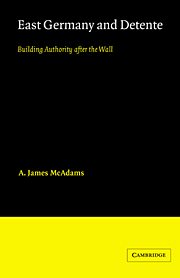5 - REDEFINING EAST GERMAN PRIORITIES: 1972–1978
Published online by Cambridge University Press: 17 September 2009
Summary
Detente and peaceful coexistence are both phenomena that are inseparably bound up with the historical conflict between socialism and imperialism, between the forces of societal progress and those of reaction.
Sozialismus und Entspannung (1980)NEW SURROUNDINGS
Erich Honecker, the long-time apparent crown prince in East Germany, succeeded Walter Ulbricht as the head of the SED on 3 May 1971, and the GDR reached a turning point in its history, comparable in significance to that which the state had experienced ten years earlier with the construction of the Berlin Wall. This was not just because of the different leadership styles that the two men represented, the outspoken, assertive, and sometimes arrogantly self-confident style of Ulbricht versus what turned out to be a more stability-minded, bureaucratic, and vocally pro-Soviet slant of Honecker. The GDR's environment itself had changed. One decade after the Wall's construction, the shell of nonrelations surrounding the country had collapsed, and East Germany was exposed abruptly to the world outside its borders.
As we shall see, this new situation meant several things for the GDR's Party leadership: the introduction of regular contacts between East Berlin and Bonn, a less than satisfactory resolution of outstanding differences over the city of Berlin and the nature of inter-German relations, and what amounted to a daily ‘reunification’ of Germany by millions of private citizens on the basis of family ties and friendship. Just by themselves, these factors were undeniably important.
- Type
- Chapter
- Information
- East Germany and DetenteBuilding Authority after the Wall, pp. 116 - 160Publisher: Cambridge University PressPrint publication year: 1985

